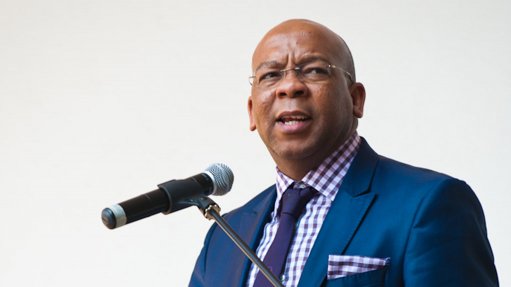
Dr Kgosientso Ramokgopa
The South African government has promised investors that it is fully committed to making it easier and cheaper to do business through streamlining processes and licence applications.
Dr Kgosientso Ramokgopa, who heads up South Africa’s new Investment Infrastructure Office, said he was advocating for policy reforms to make the investment environment less rigid. The office was also working on simplifying processes for investors.
“We will create a single window of entry into the country for investors,” he told a South African mining investment seminar at the 2020 Investing in African Mining Indaba, in Cape Town.
He acknowledged that it was a problem that potential investors needed to apply to national departments for water-use licences, to provincial departments for environmental-impact assessments and to local municipalities for electrification, zoning and other certification. He said this took 26 months on average.
Ramokgopa said this would change, as the government wanted to make these processes easier, particularly for "big-ticket investments" in the country.
“With a single entry, government will ensure it coordinates the response to investments, making lending easier. We want to create a soft landing for investors.”
Ramokgopa, who was appointed in November last year, is charged with helping to achieve President Cyril Ramaphosa’s goal of attracting R1.2-trillion in new investments over a period of five years.
Speeding up the approval of public–private partnerships (PPP) is also a priority. Ramokgopa said the current time to approve a PPP is three to five years, but the office hopes to help reduce this to eight months through boosting efficiencies.
“The conditions are right to think in the most aggressive and bold manner, with project pipelines and a suite of policy reforms to enable investors going forward. That dispensation is going to be a new normal going into the future,” said Ramokgopa.
Mineral Resources and Energy Minister Gwede Mantashe, meanwhile, said the merging of the departments of Mineral Resources and Energy, which would be completed on May 31, was also expected to remove some logjams.
Mantashe said he would have to scale down the combined department from two director-generals to one.
“On May 31, we will be one department, with one director-general, one policy and one system.”
Earlier at the Investing in African Mining Indaba, Mantashe said the merger of the two departments asserted their "mutually reinforcing nature".
“This should result in a department that is adequately capacitated, efficient and responsive to the needs of the industry and the economy.”
Ramaphosa announced last May that Mantashe would take on energy, in addition to his mineral resources role. The merger of the two departments reflects the period before the Jacob Zuma administration when energy and mineral resources operated as one department.
Mantashe said he was pleased that the mining industry and the government had emerged from its earlier tensions.
“We need to correct dealing with the mining industry as opponents. We were in court every second week. We have not been in court for some time. We have created a new environment where the industry and the Minister are talking. We have changed from being adversaries to partners.”
The Minister also reiterated that investment in mining exploration was essential.
“We have talked to the Council for Geoscience about more investment in exploration because if we don’t do exploration, there is no life blood for mining.”